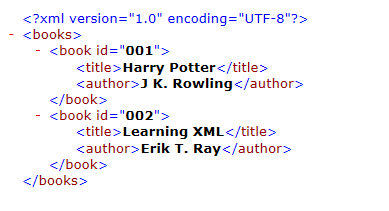Using dom4j to parse xml in java (sample code)
Although there are two standard parsing methods, Dom and Sax, in Java
, they are not easy to operate. For a beginner like me, some of the codes are disgusting.
To this end, great third-party development groups have developed tools such as Jdom and Dom4j
In view of the current trend, we will talk about the basic usage of Dom4j here, without involving complex operations such as recursion
Dom4j has many uses, and the examples on the official website are a bit obscure, so I won’t go into them here
First we need to create an xml document, and then we can parse it
xml document:
<?xml version="1.0" encoding="UTF-8"?>
<books>
<book id="001">
<title>Harry Potter</title>
<author>J K. Rowling</author>
</book>
<book id="002">
<title>Learning XML</title>
<author>Erik T. Ray</author>
</book>
</books>Example 1: Use List to parse xml
import java.io.File;
import java.util.List;
import org.dom4j.Attribute;
import org.dom4j.Document;
import org.dom4j.Element;
import org.dom4j.io.SAXReader;
public class Demo {
public static void main(String[] args) throws Exception {
SAXReader reader = new SAXReader();
File file = new File("books.xml");
Document document = reader.read(file);
Element root = document.getRootElement();
List<Element> childElements = root.elements();
for (Element child : childElements) {
//未知属性名情况下
/*List<Attribute> attributeList = child.attributes();
for (Attribute attr : attributeList) {
System.out.println(attr.getName() + ": " + attr.getValue());
}*/
//已知属性名情况下
System.out.println("id: " + child.attributeValue("id"));
//未知子元素名情况下
/*List<Element> elementList = child.elements();
for (Element ele : elementList) {
System.out.println(ele.getName() + ": " + ele.getText());
}
System.out.println();*/
//已知子元素名的情况下
System.out.println("title" + child.elementText("title"));
System.out.println("author" + child.elementText("author"));
//这行是为了格式化美观而存在
System.out.println();
}
}
}Example 2: Use Iterator to parse xml
import java.io.File;
import java.util.Iterator;
import org.dom4j.Attribute;
import org.dom4j.Document;
import org.dom4j.Element;
import org.dom4j.io.SAXReader;
public class Demo {
public static void main(String[] args) throws Exception {
SAXReader reader = new SAXReader();
Document document = reader.read(new File("books.xml"));
Element root = document.getRootElement();
Iterator it = root.elementIterator();
while (it.hasNext()) {
Element element = (Element) it.next();
//未知属性名称情况下
/*Iterator attrIt = element.attributeIterator();
while (attrIt.hasNext()) {
Attribute a = (Attribute) attrIt.next();
System.out.println(a.getValue());
}*/
//已知属性名称情况下
System.out.println("id: " + element.attributeValue("id"));
//未知元素名情况下
/*Iterator eleIt = element.elementIterator();
while (eleIt.hasNext()) {
Element e = (Element) eleIt.next();
System.out.println(e.getName() + ": " + e.getText());
}
System.out.println();*/
//已知元素名情况下
System.out.println("title: " + element.elementText("title"));
System.out.println("author: " + element.elementText("author"));
System.out.println();
}
}
}Running results:

Example 3: Create xml document and output to file
import java.io.File;
import java.io.FileOutputStream;
import org.dom4j.Document;
import org.dom4j.DocumentHelper;
import org.dom4j.Element;
import org.dom4j.io.OutputFormat;
import org.dom4j.io.XMLWriter;
public class Demo {
public static void main(String[] args) throws Exception {
Document doc = DocumentHelper.createDocument();
//增加根节点
Element books = doc.addElement("books");
//增加子元素
Element book1 = books.addElement("book");
Element title1 = book1.addElement("title");
Element author1 = book1.addElement("author");
Element book2 = books.addElement("book");
Element title2 = book2.addElement("title");
Element author2 = book2.addElement("author");
//为子节点添加属性
book1.addAttribute("id", "001");
//为元素添加内容
title1.setText("Harry Potter");
author1.setText("J K. Rowling");
book2.addAttribute("id", "002");
title2.setText("Learning XML");
author2.setText("Erik T. Ray");
//实例化输出格式对象
OutputFormat format = OutputFormat.createPrettyPrint();
//设置输出编码
format.setEncoding("UTF-8");
//创建需要写入的File对象
File file = new File("D:" + File.separator + "books.xml");
//生成XMLWriter对象,构造函数中的参数为需要输出的文件流和格式
XMLWriter writer = new XMLWriter(new FileOutputStream(file), format);
//开始写入,write方法中包含上面创建的Document对象
writer.write(doc);
}
}Run result:

For more articles related to using dom4j to parse xml in java (sample code), please pay attention to the PHP Chinese website!

Hot AI Tools

Undresser.AI Undress
AI-powered app for creating realistic nude photos

AI Clothes Remover
Online AI tool for removing clothes from photos.

Undress AI Tool
Undress images for free

Clothoff.io
AI clothes remover

Video Face Swap
Swap faces in any video effortlessly with our completely free AI face swap tool!

Hot Article

Hot Tools

Notepad++7.3.1
Easy-to-use and free code editor

SublimeText3 Chinese version
Chinese version, very easy to use

Zend Studio 13.0.1
Powerful PHP integrated development environment

Dreamweaver CS6
Visual web development tools

SublimeText3 Mac version
God-level code editing software (SublimeText3)

Hot Topics
 1662
1662
 14
14
 1418
1418
 52
52
 1311
1311
 25
25
 1261
1261
 29
29
 1234
1234
 24
24
 Securing Your XML/RSS Feeds: A Comprehensive Security Checklist
Apr 08, 2025 am 12:06 AM
Securing Your XML/RSS Feeds: A Comprehensive Security Checklist
Apr 08, 2025 am 12:06 AM
Methods to ensure the security of XML/RSSfeeds include: 1. Data verification, 2. Encrypted transmission, 3. Access control, 4. Logs and monitoring. These measures protect the integrity and confidentiality of data through network security protocols, data encryption algorithms and access control mechanisms.
 RSS Document Tools: Building, Validating, and Publishing Feeds
Apr 09, 2025 am 12:10 AM
RSS Document Tools: Building, Validating, and Publishing Feeds
Apr 09, 2025 am 12:10 AM
How to build, validate and publish RSSfeeds? 1. Build: Use Python scripts to generate RSSfeed, including title, link, description and release date. 2. Verification: Use FeedValidator.org or Python script to check whether RSSfeed complies with RSS2.0 standards. 3. Publish: Upload RSS files to the server, or use Flask to generate and publish RSSfeed dynamically. Through these steps, you can effectively manage and share content.
 Is There an RSS Alternative Based on JSON?
Apr 10, 2025 am 09:31 AM
Is There an RSS Alternative Based on JSON?
Apr 10, 2025 am 09:31 AM
JSONFeed is a JSON-based RSS alternative that has its advantages simplicity and ease of use. 1) JSONFeed uses JSON format, which is easy to generate and parse. 2) It supports dynamic generation and is suitable for modern web development. 3) Using JSONFeed can improve content management efficiency and user experience.
 XML's Advantages in RSS: A Technical Deep Dive
Apr 23, 2025 am 12:02 AM
XML's Advantages in RSS: A Technical Deep Dive
Apr 23, 2025 am 12:02 AM
XML has the advantages of structured data, scalability, cross-platform compatibility and parsing verification in RSS. 1) Structured data ensures consistency and reliability of content; 2) Scalability allows the addition of custom tags to suit content needs; 3) Cross-platform compatibility makes it work seamlessly on different devices; 4) Analytical and verification tools ensure the quality and integrity of the feed.
 From XML to Readable Content: Demystifying RSS Feeds
Apr 11, 2025 am 12:03 AM
From XML to Readable Content: Demystifying RSS Feeds
Apr 11, 2025 am 12:03 AM
RSSfeedsareXMLdocumentsusedforcontentaggregationanddistribution.Totransformthemintoreadablecontent:1)ParsetheXMLusinglibrarieslikefeedparserinPython.2)HandledifferentRSSversionsandpotentialparsingerrors.3)Transformthedataintouser-friendlyformatsliket
 Building Feeds with XML: A Hands-On Guide to RSS
Apr 14, 2025 am 12:17 AM
Building Feeds with XML: A Hands-On Guide to RSS
Apr 14, 2025 am 12:17 AM
The steps to build an RSSfeed using XML are as follows: 1. Create the root element and set the version; 2. Add the channel element and its basic information; 3. Add the entry element, including the title, link and description; 4. Convert the XML structure to a string and output it. With these steps, you can create a valid RSSfeed from scratch and enhance its functionality by adding additional elements such as release date and author information.
 RSS Documents: How They Deliver Your Favorite Content
Apr 15, 2025 am 12:01 AM
RSS Documents: How They Deliver Your Favorite Content
Apr 15, 2025 am 12:01 AM
RSS documents work by publishing content updates through XML files, and users subscribe and receive notifications through RSS readers. 1. Content publisher creates and updates RSS documents. 2. The RSS reader regularly accesses and parses XML files. 3. Users browse and read updated content. Example of usage: Subscribe to TechCrunch's RSS feed, just copy the link to the RSS reader.
 XML/RSS Interview Questions & Answers: Level Up Your Expertise
Apr 07, 2025 am 12:19 AM
XML/RSS Interview Questions & Answers: Level Up Your Expertise
Apr 07, 2025 am 12:19 AM
XML is a markup language used to store and transfer data, and RSS is an XML-based format used to publish frequently updated content. 1) XML describes data structures through tags and attributes, 2) RSS defines specific tag publishing and subscribed content, 3) XML can be created and parsed using Python's xml.etree.ElementTree module, 4) XML nodes can be queried for XPath expressions, 5) Feedparser library can parse RSSfeed, 6) Common errors include tag mismatch and encoding issues, which can be validated by XMLlint, 7) Processing large XML files with SAX parser can optimize performance.




